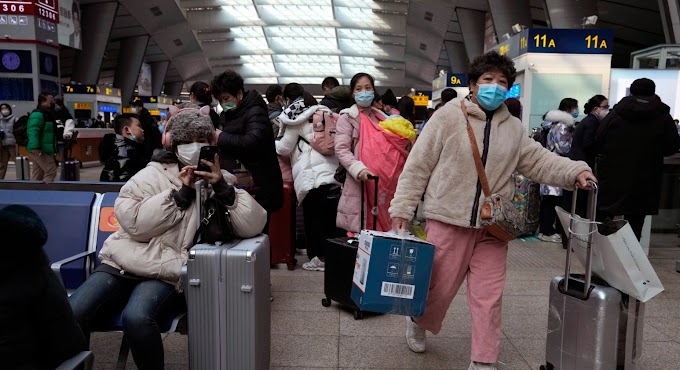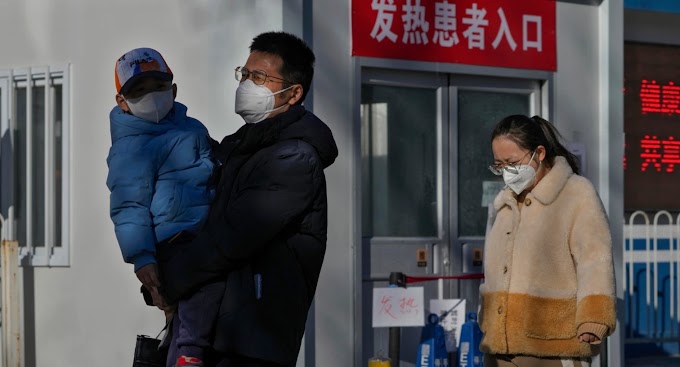A Light Analysis of State Affairs The Sunshine of Humanity and Freedom the Blank Paper Revolution
 |
| People in Beijing gathered under the Liangma Bridge to protest the authorities' strict anti-epidemic policies. (November 28, 2022) |
Editor's note: This is an opinion piece written by Wu Guoguang for Voice of America. This guest commentary does not reflect the views of Voice of America. Reprinters please indicate that they are from Voice of America or VOA.
Perhaps a couple of sentences can be borrowed from the inappropriate person to roughly express the gist of this article. One sentence says: "Revolution is a great festival of the people" - this is from Lenin, the founder of the communist regime in the Soviet Union. Another sentence comes from Mao Zedong. He said: "A piece of blank paper has no other burdens. It is easy to write the latest and most beautiful words, and it is easy to draw the latest and most beautiful pictures." Using the words of Lenin and Mao Zedong to describe the effect of China's "blank paper revolution" is of course quite absurd, and may not be politically correct, but I don't like talking nonsense because of people, so I still borrow it. The true meaning of quoting these two sentences lies in my continued observation of the "blank paper protest" of the Chinese people, and I have come up with four points of view; these points of view together highlight the spiritual liberation and humanity of this protest for the Chinese people The positive effect of regression.
 |
| People in Beijing took to the streets holding blank papers to protest China's strict epidemic prevention policy and mourn the victims of the fire in Urumqi. (November 27, 2022) |
"Not one of them is a man"? But there are thousands of good daughters!
The white paper and the yellow umbrella are held together, and the Han people share the same feelings for the people.
Another observation is that I saw that the Chinese people, especially the young people who participated in the "blank paper protest" began to understand the struggle of the Hong Kong people since the "Umbrella Revolution". It is said that some of the participants in the "blank paper protest" were sympathetic and even hostile to the protests of the Hong Kong people. According to Hong Kong, these people belong to the "blue silk" who stand on the side of the Chinese authorities, not the "yellow silk" who demand the rights of the people. The causes of this situation are complex and will not be analyzed here. However, when the mainland people also had to take to the streets to defend their basic rights, they had in fact stood in the same team as the Hong Kong people who were fighting for their rights.
The third observation is similar to this, that is, during the “blank paper protests,” mutual sympathy between Han Chinese and Uyghur people has increased. It should be said that the origin of this protest is Urumqi, Xinjiang. It should be said that it is not accidental. It is there that the "big prison" system that deprived people of their minimum biological freedom, which was established in various parts of China during the three-year epidemic, was established earlier for the Uyghur people. The "square cabin hospitals" in the mainland, in terms of depriving residents of their freedom and brutally treating each resident, are actually the mainland version of Xinjiang's so-called "education transformation centers" and "concentration camps." People in the same concentration camp know each other without meeting each other. In the previous article of this column, the observation of "empathy" was put forward on the "blank paper revolution", and the two-way understanding between land and port that is beginning to appear, and the mutual sympathy between Han and Uygur are all further manifestations of this empathy.
 |
| Demonstrators gathered on the campus of the University of California, Berkeley to protest the Chinese government's harsh anti-epidemic policy. (November 28, 2022) |
Overseas is no longer the world of "little pinks", right?
The fourth observation extends overseas. Here, for the first time in decades, there have been political awakenings and protests among Chinese students studying abroad to demand rights, pursue freedom, and support the domestic "blank paper revolution". In modern Chinese history, from the end of the Qing Dynasty, the Republic of China to the end of the 20th century, overseas students and a wider group of overseas Chinese have always been one of the vanguard forces promoting China's progress. Over the past quarter of a century, overseas seems to have become the domain of the so-called "little pinks". Relying on the rise of China's material power, taking advantage of the pluralistic and tolerant environment of a free society, it has become popular to live abroad but take "patriotism" as work. Now, it is the "blank paper revolution" that is changing this atmosphere.
Why is there such a wide range of understanding, empathy and awakening accompanying the "blank paper revolution"? Going back to Lenin’s words at the beginning but changing them, it can be said: Revolution is the spiritual liberation of the people. Based on the above four observations alone, the "Blank Paper Movement" indeed deserves the title of "revolution" because it aroused meaningful changes in the depths of human nature. If these changes continue to ferment, solving millennial problems such as gender equality and national reconciliation will not be a dream! Leaving aside the words of Mao Zedong quoted at the beginning, let me give an explanation: A piece of white paper can reflect the sunshine of humanity and freedom!








